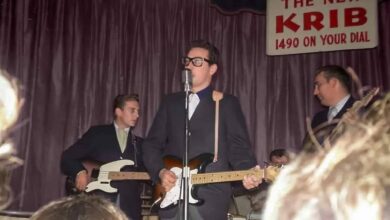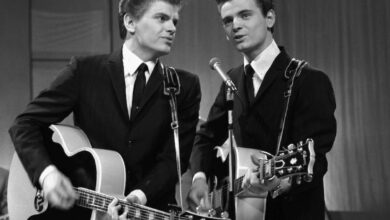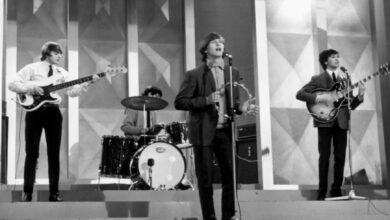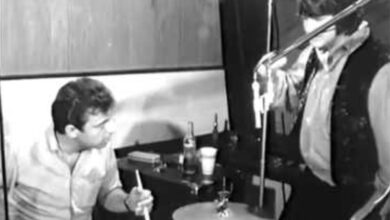Small Faces’ ‘All or Nothing’ Becomes a Mod Anthem in 1966
In 1966, All or Nothing by Small Faces took the UK music scene by storm, capturing the raw intensity of youthful passion and cementing the band’s place in rock history. Released in August of that year, the song quickly climbed the charts, reaching No. 1 on the UK Singles Chart and remaining there for a week. With its emotive delivery, soul-infused rock sound, and anthemic chorus, All or Nothing became a defining track of the mod movement, standing as a timeless testament to the energy and spirit of 1960s British rock.
Small Faces, formed in 1965 in London, were a key band in the burgeoning mod scene. The group, led by the charismatic and immensely talented Steve Marriott, blended elements of rhythm and blues with rock, crafting a distinctive sound that resonated with the sharp-dressed, scooter-riding youth of the era. Alongside Marriott, Ronnie Lane (bass), Ian McLagan (keyboards), and Kenney Jones (drums) completed the lineup, creating a tight and dynamic unit that would go on to influence generations of musicians. Unlike many of their contemporaries, Small Faces embraced a working-class authenticity that set them apart, and their music reflected the highs and lows of youthful ambition and heartbreak.
The inspiration for All or Nothing came from Marriott’s personal life, particularly his tumultuous relationship with model Jenny Rylance. The lyrics depict the agony of unreciprocated love and the desperation of wanting complete devotion from a partner. Marriott’s passionate vocal delivery, tinged with both anger and vulnerability, makes the song deeply relatable to anyone who has experienced heartbreak. The directness of the lyrics—“I thought you’d listen to my reason / But now I see, you don’t hear a thing”—captures the frustration of lost love, giving the track an emotional depth that resonated with listeners.
The recording process of All or Nothing took place at IBC Studios in London under the production of Don Arden and engineered by Glyn Johns, who would later work with The Rolling Stones and Led Zeppelin. Unlike the polished pop hits of the time, the song had a raw and organic sound, with Marriott’s gritty vocals leading the charge. The track’s structure is simple yet effective, built around a driving rhythm and impassioned vocal crescendos. The interplay between the guitar, bass, and keyboards creates a thick, soulful groove, with Kenney Jones’ drumming adding urgency to the track’s message.
Upon its release, All or Nothing was met with immediate success. It not only topped the UK charts but also became one of the most beloved songs of the mod era. Fans connected with its sincerity, and the song’s anthemic quality made it a staple at mod gatherings. Though it did not chart as highly in the U.S., its influence within the British music scene was undeniable. The song marked Small Faces’ biggest commercial triumph and remains one of their most enduring classics.
Beyond its chart success, All or Nothing had a lasting impact on rock music. It showcased the power of emotionally charged songwriting and helped bridge the gap between R&B-influenced British rock and the heavier sounds that would emerge later in the decade. The song’s raw energy and directness foreshadowed the approach of bands like Led Zeppelin and The Faces, the latter of which featured both Lane and McLagan after Small Faces disbanded.
For Small Faces, All or Nothing was a career-defining moment. While they had achieved earlier success with hits like Sha-La-La-La-Lee and Watcha Gonna Do About It, this track solidified their reputation as serious rock musicians rather than just a pop-oriented mod band. However, despite their success, tensions within the band would soon rise, and Marriott’s growing frustration with the constraints of the pop industry would lead to his departure and the eventual dissolution of the group in 1969.
The song’s influence extended far beyond its initial release. Many artists have cited Small Faces as a major inspiration, and All or Nothing has been covered by various musicians, including punk rock acts and soul singers alike. Rod Stewart, who later fronted The Faces, performed the song live, bringing his own gravelly intensity to Marriott’s heart-wrenching lyrics. More recently, Paul Weller, often considered the modern torchbearer of mod culture, has expressed admiration for Small Faces and their raw, heartfelt style.
In addition to its musical impact, All or Nothing became deeply personal for the band. Marriott himself later reflected on the song, recognizing it as one of his most honest and heartfelt compositions. Sadly, his life was cut short in 1991 when he died in a house fire, but his legacy as one of Britain’s greatest rock vocalists remains firmly intact. The song continues to be a centerpiece in tributes to his work, celebrating his unparalleled ability to infuse emotion into rock music.
Decades after its release, All or Nothing remains an essential part of the British rock canon. It continues to be played on classic rock stations, features in numerous “greatest songs” lists, and resonates with new generations of listeners discovering the depth of Small Faces’ catalog. The song’s ability to capture raw emotion and channel it into anthemic rock ensures its longevity.
Ultimately, All or Nothing stands as more than just a hit song—it represents the passion and intensity of a pivotal era in British rock. It captures the essence of youthful longing and frustration in a way that few songs can. Small Faces may have had a relatively short career, but their impact on rock music, and particularly the mod movement, is undeniable. In the history of 1960s rock, All or Nothing remains a shining example of how sincerity, soul, and raw power can come together to create something truly timeless.



